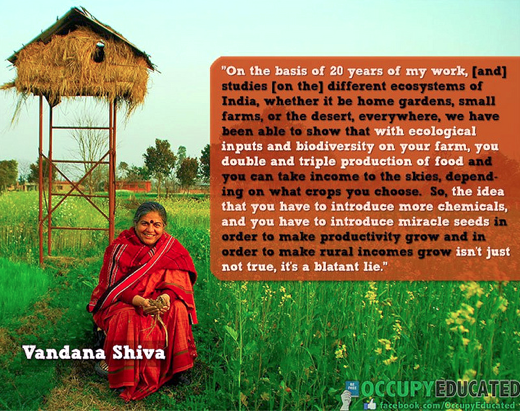SOURCE: Katie Gelfling (k.gelfling@gmail.com)
SUBHEAD: A parliamentary panel said it had no confidence in agricultural biotechnology.
By HT Correspondent on 9 August 2012 for Hindustan Times -
(http://www.hindustantimes.com/India-news/NewDelhi/No-trust-in-farm-biotech-House-panel-junks-GM-crops/Article1-911158.aspx#.UCQIgcQQaDE.mailto)

Image above: Illustration with Vandana Shiva arguing against biotechnology use in India. From (http://www.flickr.com/photos/10284369@N07/7611537224/).
A decade after India officially allowed GM crops to be cultivated, a parliamentary panel said it had no confidence in farm biotechnology. The panel cited concerns over health and environment issues. The report poses a fresh policy dilemma for the government and the seed industry with implications on the farm economy. The parliamentary standing committee on agriculture, led by CPM's Basudeb Acharya, which tabled the report “Cultivation of Genetically Modified Food Crops - Prospects and Effects” also called for a reversal of the policy.
“The committee has come to the conclusion that since concerns on the potential and actual impacts of GM crops to our food, farming, health and environment are valid, GM crops are just not the right solution for our country,” Acharya said.
Criticising the haste with which the government had promoted GM crops, Acharya said the government “should stop parroting the promotional lines of the biotechnology and seed industry and their cronies within the technocracy and stand by scientific reasoning and greater public good”.
The committee had travelled across the country and consulted various stakeholders including farmers, biotechnology industry on the issue.
The report states that Bt cotton, India's only commercially cultivated GM crop, had not improved the socio-economic condition of cotton farmers in the country and had intensified their distress especially in the rainfed areas of the country which forms the majority of cotton and farmer suicide belt.
The report pointed out grave inadequacies with the regulatory system on GM crops.
Apart from recommending a decision-making role for states in any open release of GM crops, the report recommended the discontinuation of open field trials due to danger of contamination.
See also:
Ea O Ka Aina: GMO Companies Stung 8/21/12 .
SUBHEAD: A parliamentary panel said it had no confidence in agricultural biotechnology.
By HT Correspondent on 9 August 2012 for Hindustan Times -
(http://www.hindustantimes.com/India-news/NewDelhi/No-trust-in-farm-biotech-House-panel-junks-GM-crops/Article1-911158.aspx#.UCQIgcQQaDE.mailto)

Image above: Illustration with Vandana Shiva arguing against biotechnology use in India. From (http://www.flickr.com/photos/10284369@N07/7611537224/).
A decade after India officially allowed GM crops to be cultivated, a parliamentary panel said it had no confidence in farm biotechnology. The panel cited concerns over health and environment issues. The report poses a fresh policy dilemma for the government and the seed industry with implications on the farm economy. The parliamentary standing committee on agriculture, led by CPM's Basudeb Acharya, which tabled the report “Cultivation of Genetically Modified Food Crops - Prospects and Effects” also called for a reversal of the policy.
“The committee has come to the conclusion that since concerns on the potential and actual impacts of GM crops to our food, farming, health and environment are valid, GM crops are just not the right solution for our country,” Acharya said.
Criticising the haste with which the government had promoted GM crops, Acharya said the government “should stop parroting the promotional lines of the biotechnology and seed industry and their cronies within the technocracy and stand by scientific reasoning and greater public good”.
The committee had travelled across the country and consulted various stakeholders including farmers, biotechnology industry on the issue.
The report states that Bt cotton, India's only commercially cultivated GM crop, had not improved the socio-economic condition of cotton farmers in the country and had intensified their distress especially in the rainfed areas of the country which forms the majority of cotton and farmer suicide belt.
The report pointed out grave inadequacies with the regulatory system on GM crops.
Apart from recommending a decision-making role for states in any open release of GM crops, the report recommended the discontinuation of open field trials due to danger of contamination.
See also:
Ea O Ka Aina: GMO Companies Stung 8/21/12 .
No comments :
Post a Comment